
Przewalski's horse, also called the takhi, Mongolian wild horse or Dzungarian horse, is a rare and endangered horse originally native to the steppes of Central Asia. It is named after the Russian geographer and explorer Nikolay Przhevalsky. Once extinct in the wild, since the 1990s it has been reintroduced to its native habitat in Mongolia in the Khustain Nuruu National Park, Takhin Tal Nature Reserve, and Khomiin Tal, as well as several other locales in Central Asia and Eastern Europe.
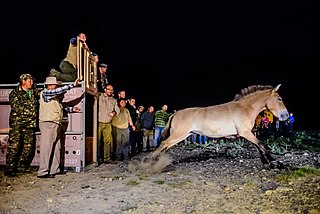
Species reintroduction is the deliberate release of a species into the wild, from captivity or other areas where the organism is capable of survival. The goal of species reintroduction is to establish a healthy, genetically diverse, self-sustaining population to an area where it has been extirpated, or to augment an existing population. Species that may be eligible for reintroduction are typically threatened or endangered in the wild. However, reintroduction of a species can also be for pest control; for example, wolves being reintroduced to a wild area to curb an overpopulation of deer. Because reintroduction may involve returning native species to localities where they had been extirpated, some prefer the term "reestablishment".

The Eurasian beaver or European beaver is a species of beaver that was once widespread in Eurasia, but was hunted to near-extinction for both its fur and castoreum. At the turn of the 20th century, only about 1,200 beavers survived in eight relict populations in Europe and Asia. It has been reintroduced to much of its former range, and now occurs from Spain, Central Europe, Great Britain and Scandinavia to a few regions in China and Mongolia. It is listed as least concern on the IUCN Red List, as it recovered well in most of Europe. It is extirpated in Portugal, Moldova, and Turkey.
Local extinction, also extirpation, is the termination of a species in a chosen geographic area of study, though it still exists elsewhere. Local extinctions are contrasted with global extinctions.
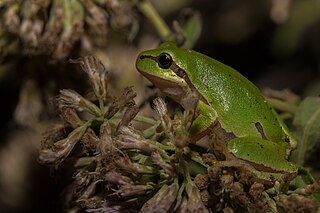
The European tree frog is a small tree frog. As traditionally defined, it was found throughout much of Europe, Asia and northern Africa, but based on molecular genetic and other data several populations formerly included in it are now recognized as separate species, limiting the true European tree frog to Europe from France to Poland and Greece.

The South China tiger is a population of the Panthera tigris tigris subspecies that is native to southern China. The population mainly inhabited the Fujian, Guangdong, Hunan and Jiangxi provinces. It has been listed as Critically Endangered on the China's Red List of Vertebrates and is possibly extinct in the wild since no wild individual has been recorded since the late 1980s. In the late 1990s, continued survival was considered unlikely because of low prey density, widespread habitat degradation and fragmentation, and other environmental issues in China. In the fur trade, it used to be called Amoy tiger.

The western quoll is Western Australia's largest endemic mammalian carnivore. One of the many marsupial mammals native to Australia, it is also known as the chuditch. The species is currently classed as near-threatened.

Ennerdale is a valley in Cumbria, England. Ennerdale Water, fed by the River Liza, is the most westerly lake in the Lake District National Park.

Pleistocene rewilding is the advocacy of the reintroduction of extant Pleistocene megafauna, or the close ecological equivalents of extinct megafauna. It is an extension of the conservation practice of rewilding, which aims to restore functioning, self-sustaining ecosystems through practices that may include species reintroductions.
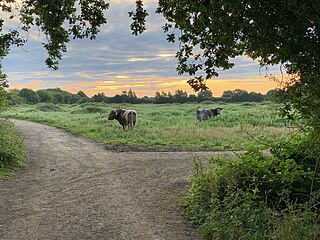
Rewilding is a form of ecological restoration aimed at increasing biodiversity and restoring natural processes. It differs from other forms of ecological restoration in that rewilding aspires to reduce human influence on ecosystems. It is also distinct from other forms of restoration in that, while it places emphasis on recovering geographically specific sets of ecological interactions and functions that would have maintained ecosystems prior to human influence, rewilding is open to novel or emerging ecosystems which encompass new species and new interactions.
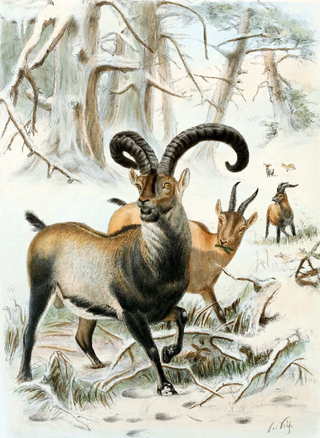
De-extinction is the process of generating an organism that either resembles or is an extinct species. There are several ways to carry out the process of de-extinction. Cloning is the most widely proposed method, although genome editing and selective breeding have also been considered. Similar techniques have been applied to certain endangered species, in hopes to boost their genetic diversity. The only method of the three that would provide an animal with the same genetic identity is cloning. There are benefits and drawbacks to the process of de-extinction ranging from technological advancements to ethical issues.

Rewilding Britain is an organisation founded in 2015 that aims to promote the rewilding of Great Britain. It is a registered charity in England, Wales and Scotland.
Rewilding Europe is a non-profit organization based in Nijmegen, the Netherlands, dedicated to create rewilded landscapes throughout Europe. The group's efforts have contributed to increase the stock of previously endangered species such as the European bison and the Iberian lynx.

Feral: Searching for Enchantment on the Frontiers of Rewilding is a 2013 book by the British activist George Monbiot. In it, Monbiot discusses rewilding, particularly in the United Kingdom. It was first published by Allen Lane, a hardback imprint of the Penguin Group. The book received positive critical reviews, and won several awards. It inspired the founding of Rewilding Britain.
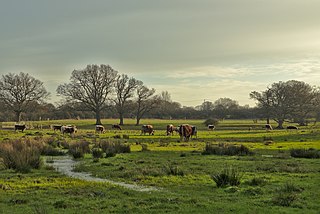
Knepp Wildland is the first major lowland rewilding project in England. It comprises 1,400 hectares of former arable and dairy farmland in the grounds of Knepp Castle, in West Sussex, England.

Iberá National Park is a national park in Argentina located in the northeast province of Corrientes. The national park adjoins the 5,530 km² Iberá Provincial Park to the southeast. The national park and provincial park are both within the Iberá Provincial Nature Reserve, a conservation area of 13,245 km² created in 1982. The combined protected area is the largest in Argentina.

The Eurasian lynx is the target of ongoing species reintroduction proposals in Great Britain. Proposed locations include the Scottish Highlands and Kielder Forest in Northumberland, England.

Celtic Reptile & Amphibian, also known as Celtic Rewilding Ltd, is a conservation company, established in 2020, by Harvey Tweats and Tom Whitehurst, with the initial aim of reintroducing extinct reptiles and amphibians back to rewilding projects within the UK. However, the company's scope has since broadened. It is based in Leek, Staffordshire.
Derek Gow is a UK-based reintroduction expert, farmer and author known for his work with watervoles, white storks, wildcats, and Eurasian beavers.

Sea rewilding is an area of environmental conservation activity which focuses on rewilding, restoring ocean life and returning seas to a more natural state. Sea rewilding projects operate around the world, working to repopulate a wide range of organisms, including giant clams, sharks, skates, sea sturgeons, and many other species. Rewilding marine and coastal ecosystems offer potential ways to mitigate climate change and sequester carbon. Sea rewilding projects are currently less common than those focusing on rewilding land, and seas are under increasing stress from the blue economy – commercial activities which further stress the marine environment. Rewilding projects held near costal communities can economically benefit local businesses as well as individuals and communities a whole.















